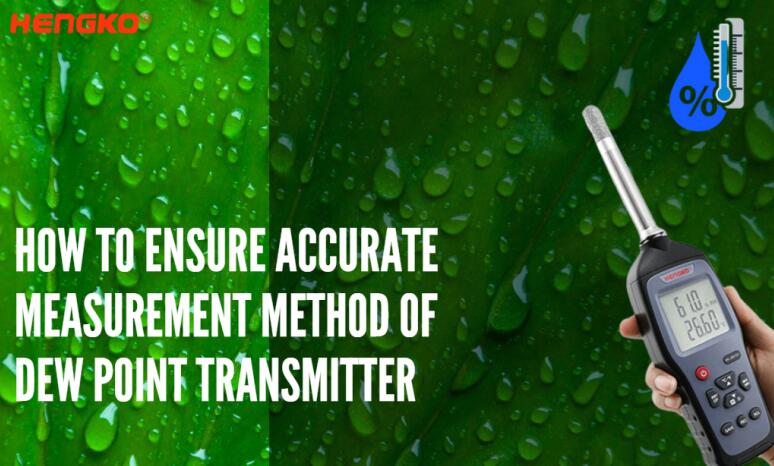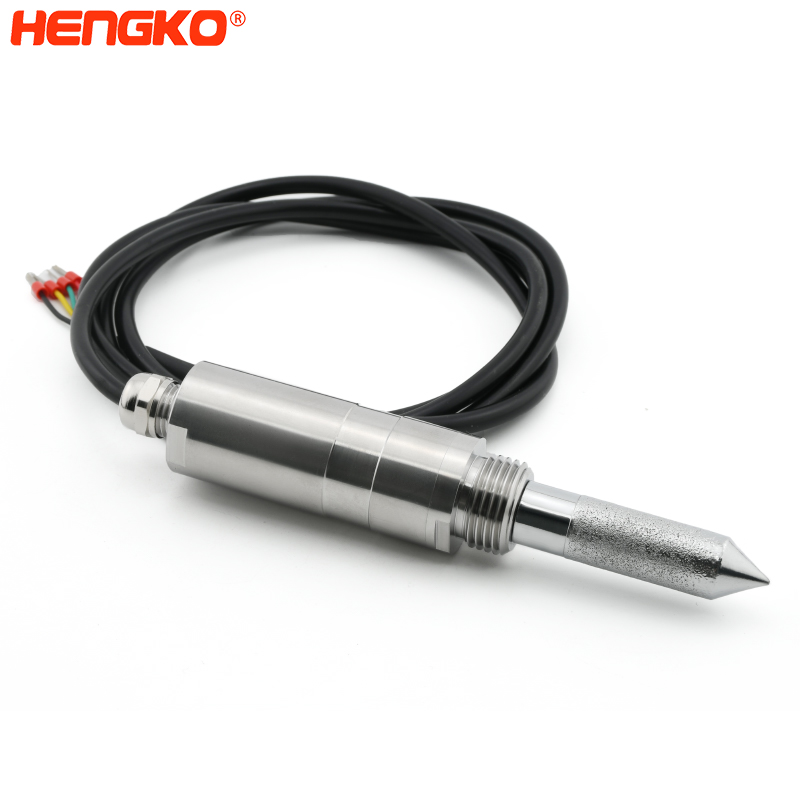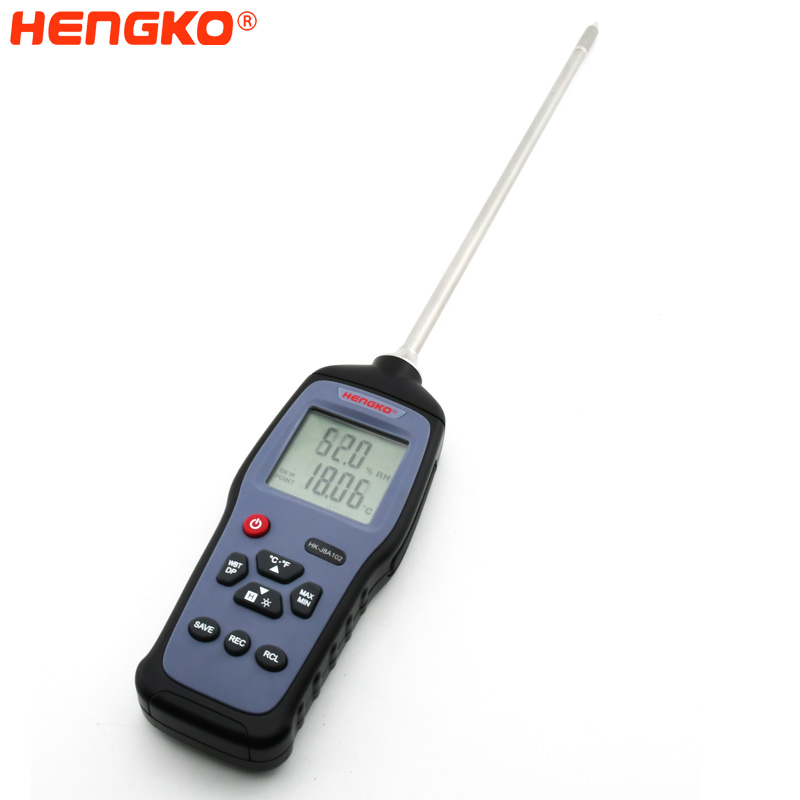How to Ensure Accurate Measurement Method of Dew Point Transmitter

How to Ensure Accurate Measurement Method of Dew Point Transmitter
Ensuring accurate measurement with a dew point transmitter is crucial for many applications, especially in industries where precise humidity control is essential. Here are some recommendations to ensure accurate measurements:
1. Proper Installation:
Ensure that the dew point transmitter is installed in a location where it can accurately represent the process conditions. Avoid areas with stagnant air or where the transmitter might be influenced by external heat sources.
2. Regular Calibration:
Like all measurement devices, dew point transmitters can drift over time. It's essential to calibrate them regularly against a known standard to ensure their accuracy. The frequency of calibration will depend on the application and the manufacturer's recommendations.
3. Avoid Contamination:
Ensure that the sensing element is not exposed to contaminants that could affect its performance. This includes oils, dust, and other particulates. Some transmitters come with filters or protective guards to help prevent contamination.
4. Consider Temperature Fluctuations:
Temperature can influence the dew point reading. Ensure that the transmitter is suitable for the temperature range of your application. If there are rapid temperature changes, consider using a transmitter with a fast response time.
5. Regular Maintenance:
Periodically inspect the transmitter for any signs of wear, damage, or contamination. Clean the sensing element as per the manufacturer's instructions.
6. Understand Your Application:
Different applications might have different requirements. For instance, a dew point transmitter used in a compressed air system might have different considerations than one used in a meteorological station. Understand the specific needs of your application and choose a transmitter that fits those requirements.
7. Choose the Right Technology:
There are various technologies available for dew point measurement, such as chilled mirror hygrometers, ceramic capacitance sensors, and aluminum oxide sensors. Each has its advantages and limitations. Ensure you choose the technology best suited for your application.
8. Avoid Rapid Pressure Changes:
Rapid changes in pressure can affect the accuracy of some dew point transmitters. If your system experiences such changes, ensure that the transmitter is designed to handle them or consider installing a pressure regulator.
9. Ensure Proper Power Supply:
Ensure that the transmitter is supplied with stable and clean power. Voltage fluctuations or electrical noise can affect the accuracy of the readings.
10. Documentation and Training:
Ensure that all personnel involved with the dew point transmitter are adequately trained on its operation, maintenance, and calibration. Keep all documentation, including calibration certificates and maintenance logs, in an easily accessible location.
By paying attention to these considerations, you can ensure that your dew point transmitter provides accurate and reliable measurements, optimizing your processes and ensuring safety and efficiency.
For Compressed Air Industrial, How You Should Do ?
Compressed Air Dew Point Transmitter are ideal for many industrial moisture measurements. The HENGKO 608 Series dew-point transmitters are compact and easy to install in pipes for measurement. They are low-cost, easy to install and robust enough to withstand harsh environments. This includes measuring humidity at line pressure, operating at high ambient temperatures, or in hazardous areas.
HT608 miniature humidity sensor is mainly used to measure water dew point in gas, which is critical for protecting equipment or ensuring product quality. To get the best accuracy from a dewpoint meter, you need to understand how different types of transmitters work and how each is appropriate for a particular application.
So in order to Ensure Accurate Measurement Method of Dew Point Transmitter, Here have 3 steps for you to setting the Dew Point Transmitter, so you can check and try as follow :
First, Correct Sampling and Installation
This step is critical for accurate humidity measurement, and choosing the right dew point transmitter for your application is only the first step to ensuring accuracy. Ensuring that your sampling system is based on best practices will ensure that moisture measurements are as accurate as possible. Avoiding common pitfalls such as dead volume, retention of water and using the wrong material will ensure the accuracy and reliability of measurements.
Second, Regular Spot Check
HENGKO recommends regular spot checks of your processes to continuously check accuracy. We recommend using HENGKO HG972 portable digital humidity meter to spot check your process. While the dew point transmitter is installed online in a fixed location, a portable hygrometer can take readings at different points in the system. This not only helps confirm online measurements, but also helps with leaks or other problems elsewhere in the testing process. Is the ideal choice for laboratory, industry, engineering temperature and humidity measurement, the product has passed the CE certification and Shenzhen Institute of Metrology certification, is a high precision temperature and humidity meter. The measurement accuracy of ±1.5%RH can be easily used with a wide range of precision dew point measuring instrument, effectively and accurately calibrate the dew point value.
Third, Keep Your Calibration Up to Date
Once installed and operating correctly with the correct sampling regulation system, the dew point measuring instrument will operate reliably. However, like all precision instruments, they are not maintenance-free and we recommend that they be checked annually to ensure they still provide reliable, accurate measurements.
HENGKO also recommends that temperature and humidity sensors not be stored for a long time before installation, as ambient humidity and temperature will adversely affect sensitive sensor blocks.
Still Have Any Questions Like to Know More Details For the Humidity Monitoring Sensor , Please feel Free To Contact Us Now.
Also You Can Send Us Email Directly As Follow : ka@hengko.com
We Will Send Back With 24-Hours, Thanks for Your Patient !


